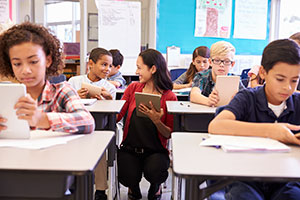How Loyola's Educational Technology Program is Different
 This past school year proved to be quite difficult for students and educators because
of the Covid-19 pandemic. Whether ready or not, the global pandemic forced educators
to solely use technology in their lesson plans and students to learn virtually. Most
of the professional development instruction that happened in schools was very techno
centric (i.e. how to use such and such tool, troubleshooting common challenges, etc.)
which left educators with only the basics to properly instruct their classes online.
In order for educators to keep up with the future of education, they must prepare
to consciously and thoughtfully and appropriately use technology in a classroom setting
to enhance the educational experience for all students.
This past school year proved to be quite difficult for students and educators because
of the Covid-19 pandemic. Whether ready or not, the global pandemic forced educators
to solely use technology in their lesson plans and students to learn virtually. Most
of the professional development instruction that happened in schools was very techno
centric (i.e. how to use such and such tool, troubleshooting common challenges, etc.)
which left educators with only the basics to properly instruct their classes online.
In order for educators to keep up with the future of education, they must prepare
to consciously and thoughtfully and appropriately use technology in a classroom setting
to enhance the educational experience for all students.In Loyola University Maryland’s Master’s in Educational Technology program, we focus not only on the HOW of technology, but also the WHY. Putting a focus on the why helps to improve motivation and student engagement. We offer a much broader perspective—we are not just using technology, we’re redefining what the instruction looks like. Loyola’s Ed Tech program is different from other schools. Our program emphasizes the advantages and disadvantages of technology, but we’re also very critical of tech (i.e. disadvantages of tech - algorithms and how we can respond, course led by David Marcovitz). Looking at how we can respond to potential problems is what separates us from other schools. “Our teaching was and is a big part of what we do as well as sharing best practices for building online communities.”
Our 36-credit Master’s in Educational Technology program is now offered completely online in addition to our existing hybrid format. We are moving beyond traditional bells and whistles of technology. Through this program, we teach multimedia design, but we are sure to instruct educators on how to intersperse opportunities for engagement so that they’re not just lecturing or screen casting. Loyola’s program ends with an individualized internship where graduate students apply their knowledge to help improve their own school or district. Ultimately, that is the goal for our programs—to prepare students and educators to be adaptable change agents who are ready for the future of education and technology. This program is nationally recognized by the International Society for Technology in Education and is a great balance of immediate application into the classroom as well as the theory and foundational learning behind it. Through this program, we develop our graduates into transformative educators and technology leaders.